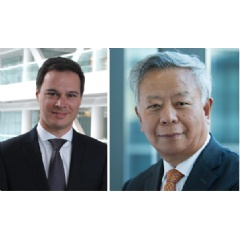Bloomberg hosts exclusive Infrastructure of Tomorrow roundtable with AIIB and CDPQ Singapore
Bloomberg recently hosted an exclusive regional virtual roundtable with Jin Liqun, President of Asian Infrastructure Investment Bank and Cyril Cabanes, Managing Director, Infrastructure, Asia Pacific at CDPQ Singapore. The industry thought leaders shared their perspectives and deep insight into the future of infrastructure – especially in Asia – and its critical role in economic recovery.
The roundtable was attended by more than 30 C-Suite leaders from across Asia and is part of Bloomberg’s RADAR – Tracking Tomorrow dialogue series.
Infrastructure of tomorrow
“Infrastructure has been impacted by COVID-19 but also pushes us to think about the balance between physical and social infrastructure. In the new era, we need to look at infrastructure done in a green manner and we aim to achieve net-zero,” said Mr Jin.
Agreeing with this, Mr Cabanes said his organisation’s focus on the infrastructure of tomorrow centred on solving problems rather than creating new ones with the objective of meeting key ESG goals, including improved governance standards and transparency. Citing an example, he said, “We and our partners committed US$3.75 billion in capital to a roads platform in Indonesia. The main goal isn’t just to invest in roads. It is to recycle capital and free more capital so the government can then build more infrastructure to benefit the country and its population.”
The role of technology in the infrastructure of tomorrow
According to Mr Jin, technology is an obvious key driver of infrastructure development. “When we build infrastructure and roads, we expect vehicles to move on the road. We need to consider what kind of vehicles will be on the road in the new era and the type of technology that will be used so the infrastructure must have that new technology,” he said.
Sustainable investment approach
Investing in projects based on ESG standards are at the top of the list for both Mr Jin and Mr Cabanes. “Fundamentally, we need to be comfortable in what we are investing in and holding for the long haul. In that sense, ESG is not a fad or the latest trend asset class but a necessity,” said Mr Cabanes. “we struggle with investments that have been structured with a short-term view and the aim to onsell two, three years later and thereby let someone else solve the sustainability question over the long term,” he added.
Mr Jin said, “Whatever kinds of investments we make, must be based on the highest ESG considerations.” He noted there is a complementary element and some areas where private and public investors can work together too. “We are very prudent in deploying our resources. But prudence has its costs, and we may not do some projects which may be considered risky. Yet, risky problems may not be considered bad. What development banks do are long-term investment projects with public goods and services which may not be attractive to private investors,” said Mr Jin.
Navigating geopolitics through infrastructure
Sharing more on how to navigate geopolitics, Mr Jin said that apolitical organisations still need to be politically sensitive and help countries develop infrastructure with cross-border connectivity. “If we develop infrastructure which links the countries, everybody has a stake in maintaining stability and making sure that infrastructure is operated smoothly. Infrastructure connectivity is an important factor to produce long-term benefits free from geopolitical issues.”
Opportunity for developing countries to leapfrog in infrastructure development
Responding to a question from the audience on how investors may not be treating first-world countries like developing countries when it comes to generating power as many are still funding “older methods” like fossil fuel energy, Mr Jin acknowledged that there is more pressure on developing countries to transition to net-zero in the short-term, but that they may have a better opportunity to leapfrog by applying new technology.
Sharing some examples, he said, “China developed the magnetic levitation trains, but this is difficult to do in Europe because of their existing railway network. In finance, the Americans had cheques and credit cards while China had stacks of cash in the 1980s. Now, China’s paperless system is the most efficient. The Americans could not do that because it is hard to dismantle the existing system.”
( Press Release Image: https://photos.webwire.com/prmedia/6/279882/279882-1.png )
WebWireID279882
This news content was configured by WebWire editorial staff. Linking is permitted.
News Release Distribution and Press Release Distribution Services Provided by WebWire.
